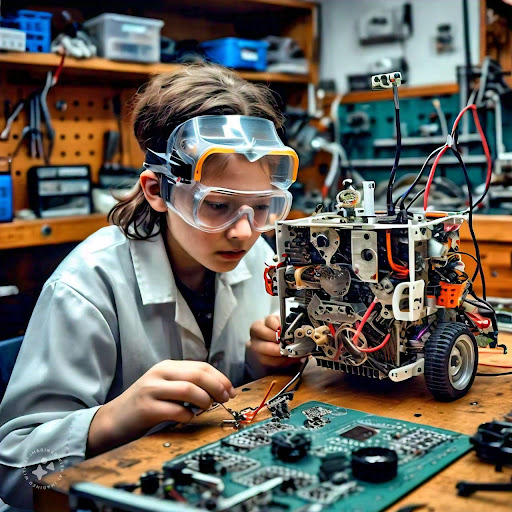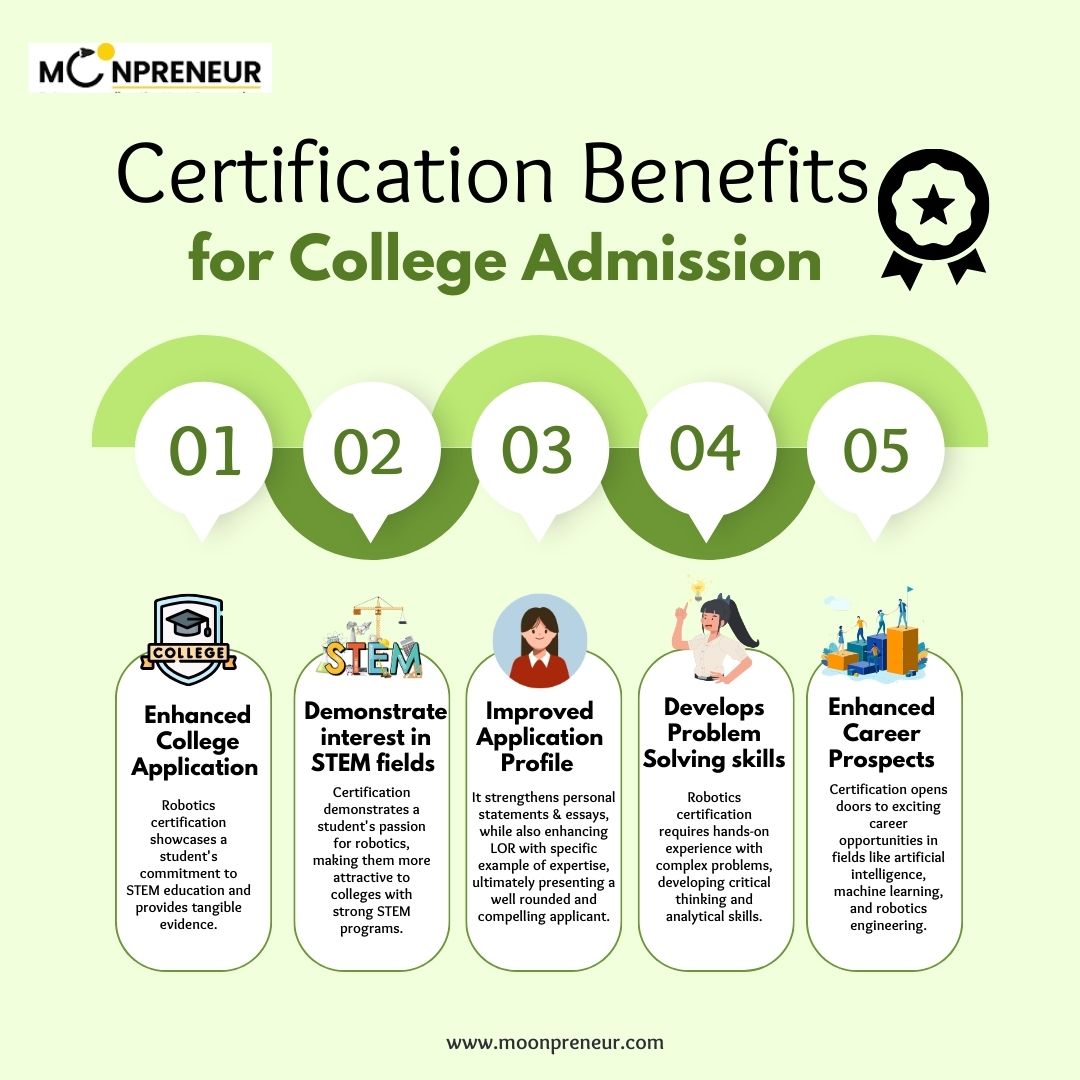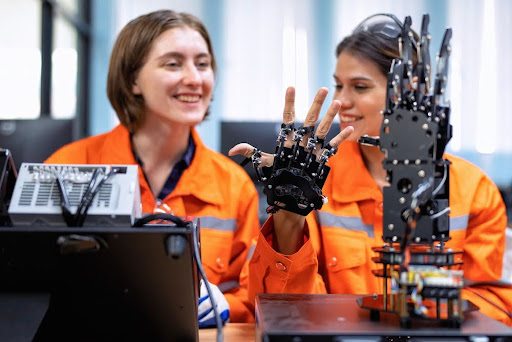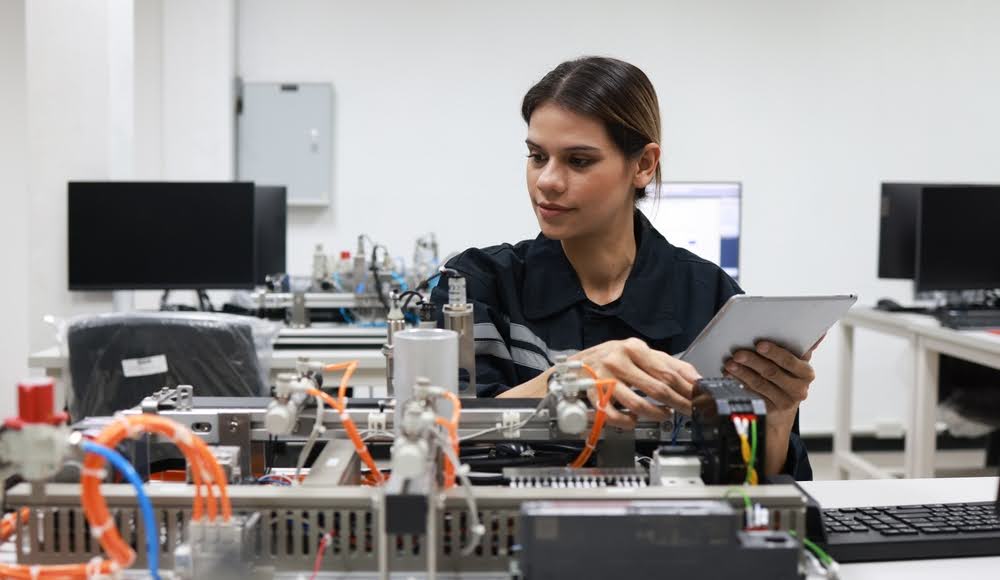Update: This article was last updated on 13th January 2026 to reflect the accuracy and up-to-date information on the page
Are you dreaming of a future in tech but worried about standing out in the competitive world of college admissions? In today’s academic landscape, colleges are seeking students with unique and specialized skills in robotics and automation. This is where the exclusivity of robotics certification comes into play. It’s a rare and powerful tool that can set you apart and open doors to a wide range of academic paths and future careers. In this article, we will explore how this exclusive certification can enhance your college admission prospects.
Learn more: Robotics for Kids: Build Future-Ready Skills

According to a survey by the Robotics Education & Competition (REC) Foundation, 85% of colleges and universities report that robotics certification is a valuable factor in admissions decisions. This high value placed on robotics certification should reassure you that your efforts in obtaining this certification will not go unnoticed in the competitive world of college admissions.
By obtaining robotics certification, students can significantly enhance their college applications, demonstrating their commitment to STEM education and showcasing their skills to admissions officers.
Learn more:
Benefits of Robotics Certification

Types of Robotics Certifications
1. Robotics Engineering Certification

Recommend Reading : How To Get Started In Robotics From Scratch – A Complete Guide
The Robotics Engineering Certification focuses on the design, development, and operation of robots. This certification covers:
- Robotics fundamentals (sensors, actuators, control systems)
- Robot design and prototyping
- Robot programming and control
- Robot vision and navigation
- Human-robot interaction
- Robotics applications (industrial, service, medical).
This certification is designed to provide students with extensive hands-on experience in building, programming, and deploying robots, ensuring they are well-prepared for real-world applications.
2. Artificial Intelligence (AI) Certification
The Artificial Intelligence Certification covers the principles, technologies, and applications of AI. Key topics include:
- AI fundamentals (machine learning, deep learning, neural networks)
- Natural Language Processing (NLP)
- Computer Vision
- Expert Systems
- Robotics and Autonomous Systems
- AI ethics and societal implications.

By earning this certification, students will be equipped to design and implement intelligent systems that can perceive, reason, and interact with their environment, thereby making a tangible impact in various industries.
3. Machine Learning Certification

A study by the National Center for Education Statistics found that students with STEM-related certifications, like robotics, have a 25% higher acceptance rate to top colleges. This statistic is a beacon of hope for students aspiring to enter the world of tech through college admissions.
The Machine Learning Certification specializes in machine learning algorithms and applications. Students learn:
- Supervised and unsupervised learning
- Regression, classification, clustering, and dimensionality reduction
- Neural networks and deep learning
- Model evaluation and selection
- Applications (image recognition, speech recognition, recommendation systems)
This certification, upon completion, enables students to develop predictive models and intelligent systems that can learn from data, opening up (exciting career opportunities in data science and machine learning).
4. Robotics Programming Certification
The Robotics Programming Certification emphasizes programming languages used in robotics, such as:
- C++ for robot control and simulation
- Python for robot scripting and automation
- Java for robot development and integration
- ROS (Robot Operating System)
- Programming robotic sensors and actuators.

This certification equips students with the skills to program and control robots using industry-standard languages and frameworks, preparing them to confidently apply their knowledge in real-world scenarios.
5. Mechatronics Certification

Did you Read : What are the Future Machine Learning Jobs?
The Mechatronics Certification combines electronics, mechanical, and software engineering to design and develop intelligent systems. Students learn:
- Electronics (circuits, microcontrollers, sensors)
- Mechanical systems (mechanisms, kinematics, dynamics)
- Software engineering (programming, algorithms, data structures)
- Integration of electrical, mechanical, and software components
- Applications (robotics, automation, intelligent systems)
This certification prepares students to design and develop complex systems that integrate multiple disciplines. These certifications in Mechatronics demonstrate expertise in specific areas of robotics and AI, paving the way for exciting career prospects. They open doors to advanced research and development opportunities, making the future look bright for students who complete this program.
How Robotics Certification Impacts College Admission

1. Increased Chances of Acceptance: Robotics certification improves a student’s chance of being accepted. It showcases demonstrated expertise, STEM commitment, and a unique skill set, setting them apart from peers.
2. Better Course Placement: This certification makes students able to jump straight into advanced STEM topics and research projects. By leveraging their certification, students can take on more specialized courses, work with renowned faculty, and gain valuable hands-on experience.
3. Scholarship Opportunities: Robotics certifications unlocks exciting scholarship opportunities, providing a significant career boost for students with a passion for STEM. Many organizations, foundations, and corporations offer scholarships exclusively to students who are certified in Robotics. These scholarships cover tuition fees, research projects, and even international internships, providing a financial safety net and a promising future.
4. Access to Research Opportunities: Robotics certification opens doors to exclusive research opportunities, allowing students to collaborate with renowned faculty and industry experts. Certified students gain priority access to cutting-edge projects, labs, and internships, fostering hands-on experience and sparking innovation.
5. Networking Advantages: Certification in Robotics connects students with a network of STEM professionals, peers, and industry leaders, fostering valuable connections and collaborations. This professional network opens doors to internship, job, and mentorship opportunities.
Top Robotics Certification Programs
| Certification Program | Description |
|---|---|
| Robotics Academy Certification | This certification is suitable for students interested in robotics, programming, and AI. Covers fundamentals, preparing them for entry-level positions. |
| Certified Robotics Engineer (CRE) | This certification is for experienced engineers who are validating their expertise in design, development, testing, and deployment. |
| Robotics and Automation Certification (RAC) | RAC focuses on automation and robotics in manufacturing, enhancing skills in robot programming and maintenance. |
| Certified Robotics Technician (CRT) | CRT is best suitable for technicians, ensuring proficiency in robot installation, maintenance, repair, and troubleshooting. |
| International Robotics Certification (IRC) | IRC is a globally recognized certification that demonstrates expertise, commitment, and knowledge of robotics principles and applications. |
Case Study: Harvard University
To understand how robotics certification can help you in college admission. Let’s have a look at this case study of Emma which helped her secure a seat at Harvard university with the help of robotics certification.
Robotics Certification: A Key Factor in Harvard Admission
Harvard University is one of the world’s most prestigious institutions of Ivy League. It has seen a significant increase in applications from students with robotics certification. In this case study, we’ll explore how this certification helped a student secure admission to Harvard.
Meet the Student

Emma Chen, a high school senior from California who had always been passionate about robotics and artificial intelligence. She pursued robotics certification through the Robotics Academy and completed courses in robotics engineering and programming.
Outcomes
Emma was accepted to Harvard University, where she’s currently pursuing a degree in Computer Science and Electrical Engineering.
Admission Officer Insights
“Emma’s robotics certification stood out in her application. It showed she had a clear passion for STEM fields and had taken concrete steps to develop her skills. Her certification demonstrated a level of expertise that aligned with Harvard’s academic standards.” – Harvard Admissions Officer
Application Process
Emma applied to Harvard University, highlighting her robotics certification and experience in her application. Her certification demonstrated:
- Depth of knowledge in STEM fields
- Hands-on experience with complex problems
- Commitment to pursuing a career in robotics and AI.
Statistics
- 25% of Harvard’s Class of 2024 had robotics or coding experience
- 15% of admitted students had certified in robotics.
- Students with robotics certification had an average GPA of 4.2 and SAT score of 1520
Harvard’s Robotics Initiatives
Harvard has invested heavily in robotics research and education, with initiatives such as:
- Harvard Robotics Laboratory
- Robotics and Artificial Intelligence Research Group
- Robotics courses and certifications through the Harvard John A. Paulson School of Engineering and Applied Sciences
Conclusion
Emma’s story demonstrates how robotics certification can be a key factor in college admission, even at the most competitive institutions like Harvard. By highlighting her certification and experience, Emma showcased her expertise and commitment to STEM fields, setting her apart from other applicants.
Takeaways
Robotics certification can:
- Demonstrate depth of knowledge in STEM fields
- Showcase hands-on experience with complex problems
- Highlight commitment to pursuing a career in robotics and AI.
Sources
- Harvard University Admissions Office
- Harvard John A. Paulson School of Engineering and Applied Sciences
- Robotics Academy
TAKE A QUIZ
How Robotics Certification Can Boost Your College Admission?
Instructions: Choose the correct answer for each question.
1. What is the primary benefit of robotics certification for college-bound students?
A) Enhanced analytical thinking
B) Improved problem-solving skills
C) Demonstrated interest in STEM fields
D) All of the above
D) All of the above
2. Which of the following certifications focuses on design, development, and operation of robots?
A) Artificial Intelligence Certification
B) Machine Learning Certification
C) Robotics Engineering Certification
D) Mechatronics Certification
C) Robotics Engineering Certification
3. What is a potential outcome of having robotics certification for college admission?
A) Increased chances of acceptance
B) Scholarship opportunities
C) Better course placement
D) All of the above
D) All of the above
4. Which organization offers certification in robotics engineering, programming, and AI?
A) Robotics Education & Competition (REC) Foundation
B) Robotics Certification Board
C) Robotics Academy
D) RobotCert
C) Robotics Academy
5. What is a key skill developed through robotics certification?
A) Critical thinking
B) Analytical thinking
C) Problem-solving
D) All of the above
D) All of the above
Conclusion
In conclusion, robotics certification is a valuable asset for students pursuing higher education in STEM fields. By enhancing college applications, demonstrating interest in STEM fields, and developing problem-solving skills, robotics certification can significantly improve chances of college admission and future career success.
By investing in robotics certification, you’ll not only enhance your college applications but also open doors to a rewarding and innovative career in STEM.
Moonpreneur offers STEM programs in Robotics, Game Development, App Development, and other futuristic sciences to help students build top-notch profiles and pursue their passion projects. Start your journey to success today!


























You should include a section on how these certifications help students develop essential soft skills, like teamwork and project management, which are often evaluated by admissions officers. I’ve read that group projects in robotics often push students to work collaboratively and think critically, which is another huge advantage!
I think it could benefit from covering some other popular robotics certifications like those from Coursera or Udacity, which are also widely recognized and accessible to students globally. Including more accessible online options would give readers a fuller view of their choices for certification programs. Overall, it’s an insightful article.